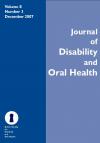Journal of Disability and Oral Health

- Cover Date:
- December 2007
- Print ISSN:
- 1470-8558
- Electronic ISSN:
- 1754-2758
- Vol:
- 8
- Issue:
- 3
The importance of follow-up dental findings to diagnose Sauk syndrome: a case report in a child
This case report presents a rare case of a 10-year-old Brazilian boy who was referred to a dental clinic of a Public Institution when he was 7-years-old because of early loss of teeth and delayed teeth eruption. Clinical features included delay in cognitive development and growth, under-weight, short stature, microcephaly, ocular hypertelorism, small but prominent ears, depressed nasal bridge, hypoplastic maxilla and prognathism. He had no nail, skin or hair abnormalities. Radiographic examination demonstrated delayed bone age, microcephaly, minimal scoliosis of the spine, taurodont mandibular and maxillary first permanent molars, diminished root formation in other mandibular and maxillary teeth, microdontia and hypodontia. Based on these dental findings after a follow up of two years, the medical history and complementary examinations, the condition of this patient was diagnosed as Sauk syndrome.
Key-words: Sauk syndrome, child, microdontia, taurodontism, hypodontia
- Article Price
- £15.00
- Institution Article Price
- £15.00
- Page Start
- 118
- Page End
- 123
- Authors
- Lucianne Cople Maia, Márcia Gonçalves Ribeiro, Ãurea Simone Barroso Vieira, Márcia Pereira Alves dos Santos
Articles from this issue
- Title
- Pg. Start
- Pg. End
- A prospective audit of a Day Stay Hospital service for the dental management of adults with disabilities
- 99
- 104
- Intranasal and intravenous sedation with midazolam in a child with special needs – a case report
- 111
- 114
- The importance of follow-up dental findings to diagnose Sauk syndrome: a case report in a child
- 118
- 123
- Mastocytosis – oral and dental manifestations and medical considerations for dental treatment: a case report
- 124
- 128
- Evaluation of oral health knowledge among personnel in an institution for the rehabilitation of disabled young adults
- 135
- 141
